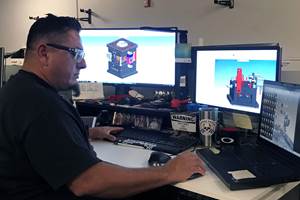Managing Expenses = Managing Your Business
Are you managing your expenses as well as you are managing your customers?
Share
I have never walked into a machine shop and seen “ugly” parts. I have never spoken with a shop owner who has told me that he has lousy customer service. I have never heard an owner tell me that he didn’t want to have new machines to run.
All of those things are great, but are you managing your expenses as well as you are managing your customers? Do you have a handle on which expenses are too important to cut and which ones can be reduced or eliminated? Making great parts is important, but making a profit will help keep your business running.
More important than any one customer or part is how you are managing, and growing, your overall cash flow. Your cash flow is basically every dollar that comes in from selling and goes back out in the form of expenses including salaries, rent, machine costs and other expenses.
One of the worst mistakes I see companies make is to put off paying bills as long as possible when the income slows down. Ask yourself, what kind of service do you give to slow payers? One of the ways of reducing this load is by determining those collectors that are willing to negotiate a longer payment term and working with them as you build the business back up.
You don’t always have the time, but it is important to have a handle on every part of your operation and improve proce-dures where you can. Analyze how the orders and the product are moving from a customer’s first call to the part’s arrival. As you go through this process, you will better understand where the unnecessary steps and bottlenecks are and work to replace them.
Employees are usually the most important yet greatest expense a company has. Get them involved in helping to cut expenses in the organization.
- Encourage your employees to focus on efficiencies in the office. These can be simple ideas about saving power or larger “green” initiatives.
- Involve your staff in cutting the cost of employee benefits without compromising the quality or scope of coverage. There may be benefits you provide that are less necessary and they would be willing to sacrifice for the health of the overall company.
- Reduce training costs by providing incentives for employees who are willing to upgrade their skills at their own expense.
Determine your ideal number of employees by comparing your needs during your slackest times with your average days. Staff for your minimum needs as long as that level will not compromise service most of the time. It’s less costly to pay overtime, or bring
in temporary help during peak periods, than to keep unnecessary employees on the payroll.
These are the costs that are under your control, but you also have to be aware of the costs that you cannot control. As you may remember from my column last month, the Chinese government is quickly making changes to their manufacturing policies.
China’s parliament adopted the enterprise income tax law, which sets a unified income tax rate for domestic and foreign companies at 25 percent. Previously, the rate had been 25 percent for domestic and only 15 percent for foreign companies entering China.
China’s income tax is the result of new requirements associated with its entry into the WTO back in 2001. You will want to be aware of this if you are planning to sell into China or have customers that are sourcing globally.
Managing your expenses is not impossible, it just requires research, organization and planning with a willingness to better understand the market globally. With some of the tips outlined here, shop owners can make significant strides in keeping their company’s expenses more manageable.
Related Content
Top 10 Topics to Cover During an ISO 9001 Manufacturing Audit
Take a look at this practical hands-on approach to conducting a quality audit.
Read MoreEditorial Guidelines: Editorial Advisory Board
The Editorial Advisory Board of MoldMaking Technology is made up of authorities with expertise within their respective business, industry, technology and profession. Their role is to advise on timely issues, trends, advances in the field, offer editorial thought and direction, review and comment on specific articles and generally act as a sounding board and a conscience for the publication.
Read MoreMold Design Review: The Complete Checklist
Gerardo (Jerry) Miranda III, former global tooling manager for Oakley sunglasses, reshares his complete mold design checklist, an essential part of the product time and cost-to-market process.
Read MoreSteps for Determining Better Mold Prices
Improving your mold pricing requires a deeper understanding of your business.
Read More










